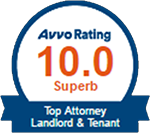Service Dogs: Breach of Leases, Tenants’ Rights, and Landlords’ Potential Liability
One issue our landlord clients frequently raise is that of dogs and under what circumstances a tenant can be allowed to keep a dog in their apartment in violation of terms of their lease. This topic invokes important Federal, State, and County law*, such as the Americans with Disabilities Act (ADA), the Fair Housing Act (FHA) and the New York Human Rights Law. A landlord’s compliance with provisions regarding so-called “service animals” is crucial as failing to do so can open a landlord or management company to claims of discrimination and expensive, unnecessary litigation.
Lease clauses prohibiting pets in apartments have consistently been held to be enforceable by New York courts and it is well established that such terms are useful to landlords and building management. Pets, especially dogs can cause damage to property through shedding; scratching; and through owners’ failure to properly dispose of their dog’s excrement and urine. Dogs with violent propensities can also threaten the safety and well-being of other tenants by biting, scratching, or jumping, and can create a nuisance through loud and annoying barking.
New York and Federal law are, however, permissive in allowing certain tenants to have service dogs in an apartment despite lease terms to the contrary, so long as the tenant meets certain criteria. The law in this area views the service animal issue through the lens disability rights and landlords’ responsibility to provide “reasonable accommodations” to individuals with disabilities. Consequently, compliance with the service animal laws is strictly enforced and failure to comply—intentional or not—could result in government fines and/or being sued for disability discrimination.
For a tenant to be entitled to have a service dog in the home the tenant must suffer from a disability, have a dog that is trained to provide service, and that service must be related to the person’s disability. There are also additional protections for individuals who train service dogs. One of the main issues landlord’s face is when they suspect that a person does not in fact have a disability or that the dog is not in fact a “service animal.” Unfortunately, for landlords in this situation, the questions they can ask and inquiry they can make is extremely limited and landlords must be very cautious so as not to violate anti-discrimination laws.
When a tenant alleges that they have a service dog because of a disability and that person’s alleged disability is not apparent, a landlord may only ask two specific and narrow questions to determine a service dog’s eligibility: 1) whether the dog is required because of a disability; and 2) what work or task the dog has been trained to perform. Whether the tenant is being truthful or not, if the tenant answer these questions such that it invokes disability discrimination protections, the landlord must immediately stop asking question or face liability.
It is important to mention that a landlord may not ask for documentation of the disability or even for specifics as to what the disability is, may not require documentation to prove the dog’s training, and may not request the dog demonstrate its ability to perform the work for which it is trained. Such questions and requirements could be determined to be direct violations of disability discrimination laws.
A tenant who adequately answers the questions cannot be charged an additional fee for having the service animal, nor can they be treated any differently from tenants who do not have service animals. However, a landlord may require a tenant to pay for damages caused by their service animal if such is specified in the lease. A landlord may only ask a tenant possessing a service animal to remove it from the property if the dog is out of control, such as biting, or if the dog is not housebroken.
In certain circumstances it is possible to require and obtain additional information regarding a purported service animal, but landlords should be cautious when requesting such follow-up information and should do so through someone knowledgeable in the area. If you have any questions, would like further clarification or have an issue with a tenant keeping an unauthorized pet in their apartment, contact James G. Dibbini & Associates, P.C. at 914-965-1011 or visit our website at dibbinilaw.com.
Increase in Rent Deregulation Threshold for 2016
As of January 1, 2016, the rent deregulation threshold was raised from $2,500 to $2,700 pursuant to the Rent Act of 2015. This means that a rent stabilized or rent controlled apartment can be deregulated, and therefore no longer subject to the Division of Housing and Community Renewal (DHCR), if it is vacated and the rent or increased rent from the vacancy is $2,700 or higher.
Additionally, an apartment can be deregulated without a vacancy if rent is equal to or exceeds $2,700 and if the tenant’s total annual income for the two preceding years exceeds $200,000. The tenant’s income is self-reported through Income Certification Forms (ICFs). The threshold of $2,700 only applies to apartments in New York City; the threshold is $2,733.75 for Nassau and Rockland Counties and $2,747.25 or $2,737.80 in Westchester County, the lesser if the tenant pays for heat or hot water.
* The Counties that make up New York City as well as Westchester County and others have separate and distinct dog laws pertaining only to their geographic areas. This issue will be explored in a future newsletter.
If you have any questions about rent deregulation, would like to speak to an attorney about ways to have an apartment deregulated, or have an issue with DHCR registration or Fair Market Rent Appeals by tenants, contact James G. Dibbini & Associates, P.C. at 914-965-1011 or visit our website at dibbinilaw.com.






